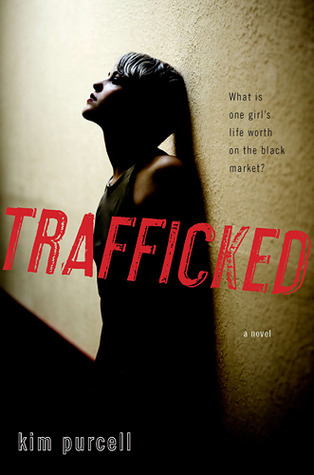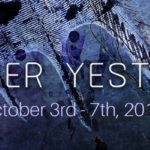Please help me welcome Kim Purcell, debut author of Trafficked! She’s stopping by today to discuss how the a language barrier can be it’s own kind of prison.

A 17-year-old Moldovan girl whose parents have been killed is brought to the United States to work as a slave for a family in Los Angeles.Hannah believes she’s being brought from Moldova to Los Angeles to become a nanny for a Russian family. But her American dream quickly spirals into a nightmare. The Platonovs force Hannah to work sixteen-hour days, won’t let her leave the house, and seem to have a lot of secrets—from Hannah and from each other.
Stranded in a foreign land with false documents, no money, and nobody who can help her, Hannah must find a way to save herself from her new status as a modern-day slave or risk losing the one thing she has left: her life.
Buy: Barnes & Noble | Amazon
No English, A Different Kind of Prison
by Kim Purcell
When I was researching TRAFFICKED, what struck me is that in every case of modern-day slavery, the girls could have walked ten feet to the neighbor’s house, but they didn’t. They feared what the traffickers would do to them and they usually didn’t speak English well enough to explain what was happening to them.
I used to teach English as a Second Language to young adults, both rich and poor. Most of them were terrified to speak English to Americans, especially if they came from a poorer background. They chose to stick with people from their own countries because they didn’t want to make mistakes. They feared being ridiculed. They didn’t want to feel stupid.
Even when someone starts to speak the language at an intermediate level, their lives are filled with misunderstandings. One time a Korean student came to class furious because he was sending a package at a Boxes Etc store and the young worker was swearing to him about another customer. I explained the worker was trying to connect with him, as he would with a friend, and that sometimes people swear to show someone that they think they’re cool. The incident made him feel more reluctant to speak with Americans because he was sure he’d make a mistake.
Being in a place where you don’t speak the language can be scary. You get lost and you can’t find your way home. You can’t order food. You can’t ask the police for help. I’ve traveled in many countries in Asia, Europe and Central America, but usually, I spoke the language. When I didn’t, I messed up.
After college, I went to Korea to teach English as a Second Language to elementary school kids. In the beginning, I had numerous misunderstandings because I didn’t speak the language. Two days after I arrived, a taxi driver dropped me off at the wrong apartment at 5 AM, coming home from a nightclub. I kept getting in taxis and they kept dropping me off at the same spot. It was like Groundhog Day. Apparently, two apartments had the same name in that neighborhood and they didn’t have addresses the way we do. Another time, a taxi driver wanted more money. I didn’t understand and he chased me down the street. I put the money on the sidewalk, too scared to hand it to him directly, but then he threw it at me. I had no way of sorting out problems because I didn’t speak Korean.
Often, modern day slaves don’t speak English and they’re terrified to try with people who could report them to police or say something to the traffickers without realizing it. And yet they live in ordinary neighborhoods. Right now, there could be someone living as a slave next door to you and you’d have no idea because they wouldn’t tell you.
After people read TRAFFICKED, they often ask me what they can do. My hope is that people will start to look around their neighborhoods and become aware of people who seem afraid to speak to them. I hope they’ll try to talk to them. In the best case, they’ll be helping someone learn English and making a friend. In the worst case, they’ll find a modern-day slave.

Photo credit: Jenn Clark
Author Bio (the short version, from her website):
I grew up in a small town. It wasn’t right for me, so I left. I went to university, got married and moved to LA. I wrote two novels before TRAFFICKED. I had two kids. We all moved to New York, which I love. In my spare time, I’m a swimmer and a runner and a yogi. I dance in elevators and change rooms. I laugh a lot and sometimes I yell.
Many thanks to Kim for stopping by today! I’ll definitely be more aware about people around me, and if they’re afraid to speak to me.












































I’m glad someone wrote a fiction book about this topic – the masses need to understand this is going on in our country!
Sadly, Purcell is right. The victims are scared. Too afraid to seek help.
stacy – girlsinthestacks.com recently posted..Currently Reading
Twitter: NinaReads
says:
Having moved to the US as an au pair myself, this is a situation I very much care about. I’m lucky enough to be fluent in English thanks to Norway’s great schools, but most of the other au pairs I made friends with were from South American and South East Asian countries, did not speak much English, and almost without exception chose to hang out with people from their own countries instead of Americans. I never even considered that it could be because they were embarrassed about their English, I kinda just assumed they preferred the company of people from their own countries.
I have seen too many situations where au pairs have been taken advantage of by their host families (working more hours than what’s legal, withholding pay, having to pay for their own food), “small” things like that, and none of the girls who’s told me this ever did anything about their situation, just accepted it for what it was. That really scares me, because if they can’t speak up about not getting the weekend off, how would they ever speak off about something as serious as what Trafficked brings up?
This became a lot longer than what I intended to write, but either way I am just happy someone’s working to put focus on this – it’s definitely something that doesn’t get enough attention in media or by the politicians that has the power to change things.
Nina Reads recently posted..The Girl in the Park by Mariah Fredericks
Great post! This issue is one I’m really interested in, and I’m looking forward to reading TRAFFICKED. I’ve also taught English as a second language, so I found what she said about her students really resounded with me – I’ve known so many similar students!
And I’m just so glad that Ms. Purcell wrote this book! It’s definitely something that needed to be written, something people need to hear about! You can find a lot of info about this sort of thing here and it includes a great video that really hits home.
KM recently posted..Query Q’s: Interview with Kirsten Hubbard, Author of Wanderlove
I’m so excited to read this book!
Especially because I can relate. English is my second language and omg, it was so hard to communicate when I first started trying, I almost always prefered to stay silent rather than looking stupid.
I’ve been fluent for 5 years now and I can tell you, the insecurities will always be there, but you will get over them!
now I always laugh it off when I mess up, and it’s alright 😉
melannie 🙂 recently posted..Waiting On Wednesday: Going Vintage by Lindsey Leavitt